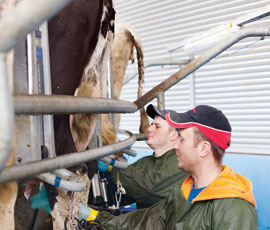Farmers Apprentice: what are employers looking for?

Investment banking has taken a beating as a profession in recent months. Yet despite an avalanche of negative publicity, young people still see it as an attractive career.
Banking offers highly sought-after internships that are oversubscribed with bright, ambitious and educated youngsters. In contrast, farming is facing a recruitment crisis.
Some of it is down to money. The salaries on offer from City companies dwarf the income many can derive from agriculture. But there is a feeling that young people also see the appeal of clear career progression routes and proactive investment in training.
So while sharing very little else in common, some farming companies and farmers are increasingly emulating their banking counterparts in a bid to find and nurture the best new talent.
| INTERVIEW QUESTIONS WORTH ASKING |
|---|
| Where do you see yourself in 10 years’ time? You are looking for someone ambitious, someone who will take your business forward and deliver returns on your investment in training. It’s about finding someone who is looking for a career, not just a job. What skills can you specifically bring to the role? Candidates should identify what it is that sets them apart from the competition. How would your friends describe you? Personal attributes are key. You need someone who is capable of fitting in to your business. Why do you want to work with us specifically? Top candidates will have researched your business, and should be able to articulate why they want to work for your farm. Again, its about finding someone looking to develop their career, not somebody who is just looking for any job. |
Graduate schemes
Recognising the importance of staff recruitment and development, The Co-operative Farms runs both apprenticeship and graduate schemes. With the latter regularly attracting 250 applicants for just two to three places, both initiatives are in great demand from individuals from farming backgrounds and new entrants alike.
David Watson, arable operations manager at The Co-operative Farms, says the focus of the apprenticeship scheme is on developing the technical on-farm workforce, although there is scope for advancement to managerial training.
The heart of the initiative is on-the-job training, with Mr Watson making it clear that the emphasis is on providing young people with the skills needed in modern farm businesses.
The new recruits are encouraged to learn from mentors that have been in the business for 30 years. Additional training is then offered through college time and study tours, working in conjunction with Reaseheath College.
“The apprenticeship that The Co-operative Farms offers provides a wage and a visible career progression route within the firm,” says Mr Watson. “Companies have certain systems and ways of doing things, be they overarching principles or specific technical nuances. It is advantageous to have cultivated a workforce tailored to The Co-operative’s practices.”
With various placements over a two-year period, the graduate scheme exposes candidates to multiple business environments, he adds.
Seeking to develop future leaders, numerous farm and senior managers within The Co-operative Farms have come through the programme.
Rhys Williams, co-director and partner of Padog Farms, a partnership currently milking 1,600 cows split across two farms, is another farmer taking a fresh approach to recruitment.
Attitude and personality
He believes that the most important aspect of growing a farm business is the people and when interviewing potential recruits he is looking as much at attitude and personality as he is at technical skills.
“If you are looking to recruit a technically skilled farmworker for a specific task, then that is a different thing,” he says.
| TIPS FOR RECRUITMENT |
|---|
|
“But when looking for staff to train for the future, personal characteristics, or soft skills, are far more important than practical skills. If young people want to get on in their career then having the right people skills is essential.”
The majority of staff on the 1,150-cow home farm are under 25, and Mr Williams strongly believes in investing in developing his recruits.
“Young people can be trained up,” he says. “They have no preconceived ideas so you can mould and develop them in the right direction. As low-cost New Zealand-style dairy production is still comparatively unusual in the UK, it far easier to train a new person than try and convert someone who is already stuck in their ways.”
Mr Williams takes a positive approach to staff training. For example, after calving this year, he arranged for a vet to walk the farm with the staff to explain nuances of mating. He also regularly arranges work placements for students with top producers in New Zealand, subsequently employing them himself.
He says the simplicity of the production system employed by the business means it is relatively easy for young people to pick up in the initial stages.
Financial rewards
But they need to be rewarded for their work. “Good people want to be paid decent money, they don’t expect to work for nothing,” he says.
“But the best people have the maturity to understand that by putting in 100% now they will be looked after in the long run.”
The partnership has generally found it easy to find the right personnel. People contact them through the Nuffield scholarship scheme, with which both directors are involved, and via local discussion groups in which they are well known; they have also taken on staff following college visits to their farms.
Mr Williams says he is particularly interested in people who actively seek employment at the farm. “If a young person is prepared to get in touch out of the blue it indicates that they have got something about them. They are the sort of people we want to invest in.”
